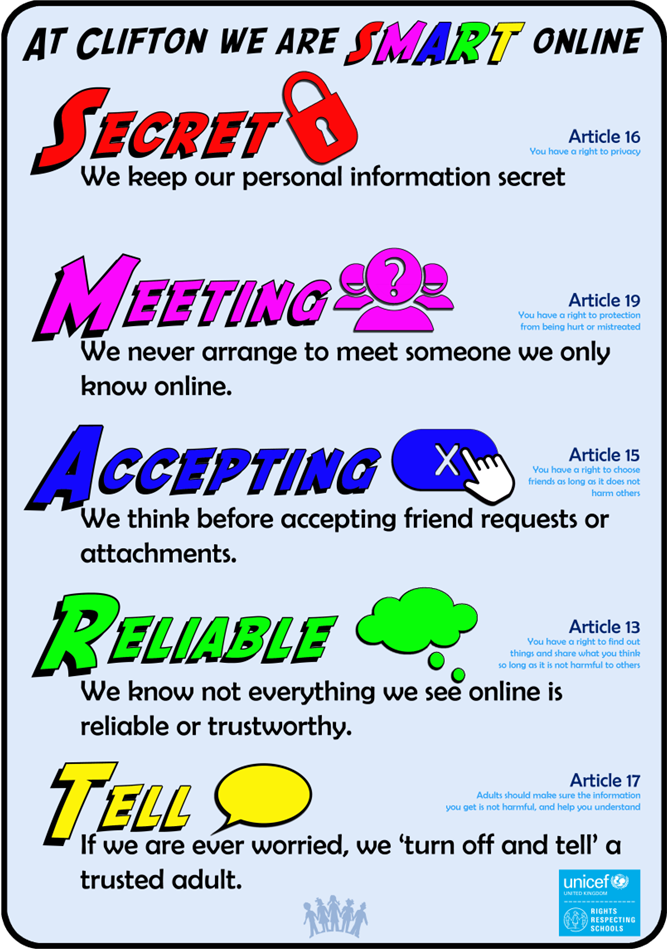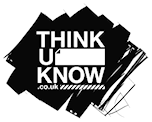Online Safety
Being SMART Online
Clifton Primary works hard to ensure that new technologies are used well to enhance learning opportunities. However, we recognise that children, parents, staff and governors need training on how to deal with online safety issues. We believe that children need to be aware of these issues in order to protect themselves and also to enable them to take advantage of the wealth of information that the Internet offers.
Online Safety at Clifton is comprehensive and is embedded through:
- a progressive ‘Digital Literacy’ curriculum that is taught in every year group in the Spring term (to coincide with National Safer Internet Day);
- full staff training, delivered annually (or more often if appropriate), as possible risks from new technologies arise;
- an Acceptable Use Policy signed by all users;
- forensic software (Policy Central) to monitor acceptable use;
- parent workshops and training delivered annually;
- information on Online Safety and report abuse buttons on our school website;
- our Safer Internet Policy which is updated annually.
This approach aims to create a managed system in school, where pupils are fully aware of the risks, including cyber-bullying, and actively try to prevent them from occurring. They understand very clearly what constitutes unsafe situations and are highly aware of how to keep themselves and others safe using the school Turn off and Tell and SMART rules.

Useful Websites
The following websites are useful for further guidance and support:
- BBC Own It – advice for children on online safety.
- Child Protection Company: eSafety Course for Parents – by taking the Parent eSafety course, you can work with your child to keep them safe on the internet and learn more about eSafety yourself as a parent.
- Childnet International – for primary children.
- Childnet International – for teachers and professionals.
- GetNetWise
- Internet Matters – a guide to help you through the many issues children can experience when using the internet.
- Internet Watch Foundation – the UK Hotline for reporting criminal online content.
- Meta (Facebook) Safety Centre – guides to Facebook settings.
- Report Online Terrorist Material (gov.uk) – report illegal terrorist information, pictures or videos you’ve found on the internet. Your report will be treated anonymously.
- ThinkUKnow – learning resource for children.
- UK Safer Internet Centre: Parental Controls – how to set up parental controls offered by your home ISP.
CEOP
CEOP is the main UK agency for keeping children safe online and has a wealth of information for parents and staff. Children are trained in school to recognise the click CEOP button (below), which they can use to report anything online that they feel is inappropriate. Within school, we have staff trained through this agency who can offer help and advice to parents.
Childline
Childline is a private and confidential service for children and young people up to the age of nineteen. During the Autumn term, workshops are run in years 4 to 6 which make children aware of this service. Children can ring to talk to counsellors for help, including that any issues that may arise online. Calls are free on 0800 1111.
Think U Know
This site aims to make online parenting simple. Here you will find practical tips and simple guidance.
ChildNet
Whether you’re puzzled by parental controls or would like to know more about gaming, this website can help. On this site you’ll find a whole host of useful ways to keep your child safe.
Useful Documents
- Advice for Parents on Cyberbullying (DfE)
- A Parent’s Guide to Facebook
- Child Safety on YouTube
- Facebook Checklist
- How to set up Facebook Privacy Controls
- How to set up Parental Controls on the Xbox 360 (Microsoft)
- How to set up Google Safe Search
- How to set up YouTube Safety Mode
- Inspecting E-Safety in Schools (Ofsted)
- Keeping up with Children on the Internet (Childnet International)
- Keeping Your Child Safe Online at Home
- Online Gaming: An Introduction for Parents and Carers (Childnet International)
Technical Advice for Parents
Make a family agreement
Take time as a family to make some key decisions, such as:
- Time limits; these may vary for children of different ages.
- What information can be shared online: SMART
- What to do if help is needed: Turn Off and Tell
- Where computers can be used: this is always best in communal rooms rather than in bedrooms.
- Which websites can be accessed.
Talk
It’s important to take time to talk to your children about what they use technology for. You could ask questions like:
- Why do they like the website?
- What can they do on it?
- What’s so fun about it?
- Who uses it at school?
- How do you talk to people?
- Who are your friends on this site?
Understand devices
Be clear on different devices and the safety aspects of each of them. You can read more on UK Safer Internet Centre’s Parents’ Guide to Technology



